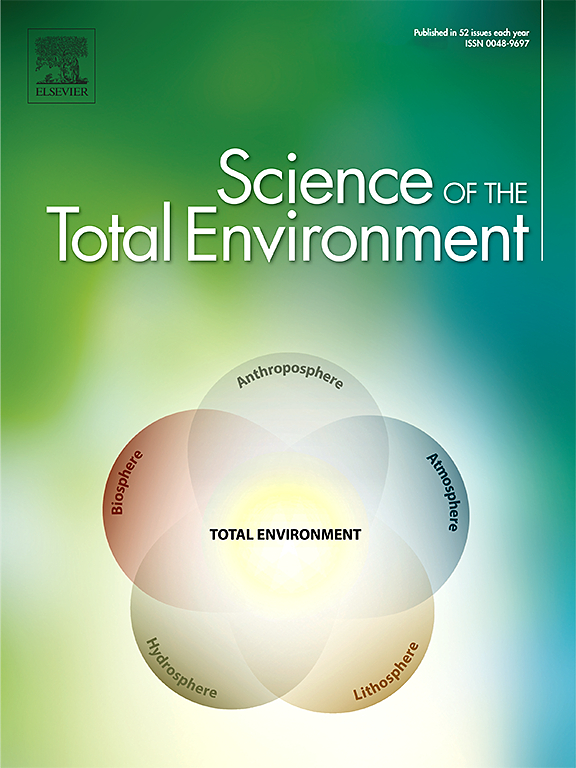Plastic pollution and marine mussels: Unravelling disparities in research efforts, biological effects and influences of global warming
IF 8
1区 环境科学与生态学
Q1 ENVIRONMENTAL SCIENCES
引用次数: 0
Abstract
The ever-growing contamination of the environment by plastics is a major scientific and societal concern. Specifically, the study of microplastics (1 μm to 5 mm), nanoplastics (< 1 μm), and their leachates is a critical research area as they have the potential to cause detrimental effects, especially when they impact key ecological species. Marine mussels, as ecosystem engineers and filter feeders, are particularly vulnerable to this type of pollution. In this study, we reviewed the 106 articles that focus on the impacts of plastic pollution on marine mussels. First, we examined the research efforts in terms of plastic characteristics (size, polymer, shape, and leachates) and exposure conditions (concentration, duration, species, life stages, and internal factors), their disparities, and their environmental relevance. Then, we provided an overview of the effects of plastics on mussels at each organisational levels, from the smaller scales (molecular, cellular, tissue and organ impacts) to the organism level (functional, physiological, and behavioural impacts) as well as larger-scale implications (associated community impacts). We finally discussed the limited research available on multi-stressor studies involving plastics, particularly in relation to temperature stress. We identified temperature as an underestimated factor that could shape the impacts of plastics, and proposed a roadmap for future research to address their combined effects. This review also highlights the impact of plastic pollution on mussels at multiple levels and emphasises the strong disparities in research effort and the need for more holistic research, notably through the consideration of multiple stressors, with a specific focus on temperature which is likely to become an increasingly relevant forcing factor in an era of global warming. By identifying critical gaps in current knowledge, we advocate for more coordinated interdisciplinary and international collaborations and raise awareness of the need for environmental coherence in the choice and implementation of experimental protocols.

塑料污染和海洋贻贝:揭示全球变暖在研究努力、生物效应和影响方面的差异。
塑料对环境日益严重的污染是一个重大的科学和社会问题。具体来说,微塑料(1 μm至5 mm)、纳米塑料(< 1 μm)及其渗滤液的研究是一个关键的研究领域,因为它们有可能造成有害影响,特别是当它们影响关键生态物种时。海洋贻贝,作为生态系统工程师和滤食性动物,特别容易受到这种污染的影响。在这项研究中,我们回顾了106篇关于塑料污染对海洋贻贝影响的文章。首先,我们考察了塑料特性(尺寸、聚合物、形状和渗滤液)和暴露条件(浓度、持续时间、种类、生命阶段和内部因素)、差异及其环境相关性方面的研究成果。然后,我们概述了塑料对贻贝在每个组织层面的影响,从较小的尺度(分子、细胞、组织和器官影响)到生物体水平(功能、生理和行为影响)以及更大规模的影响(相关的社区影响)。我们最后讨论了有限的研究可用于多应力源研究涉及塑料,特别是有关温度应力。我们认为温度是一个可能影响塑料影响的被低估的因素,并为未来的研究提出了路线图,以解决它们的综合影响。这篇综述还强调了塑料污染在多个层面上对贻贝的影响,并强调了研究努力的巨大差异和更全面研究的必要性,特别是通过考虑多种压力源,特别关注温度,这可能成为全球变暖时代日益相关的强迫因素。通过确定当前知识中的关键差距,我们倡导更加协调的跨学科和国际合作,并提高对在选择和实施实验方案时需要环境一致性的认识。
本文章由计算机程序翻译,如有差异,请以英文原文为准。
求助全文
约1分钟内获得全文
求助全文
来源期刊

Science of the Total Environment
环境科学-环境科学
CiteScore
17.60
自引率
10.20%
发文量
8726
审稿时长
2.4 months
期刊介绍:
The Science of the Total Environment is an international journal dedicated to scientific research on the environment and its interaction with humanity. It covers a wide range of disciplines and seeks to publish innovative, hypothesis-driven, and impactful research that explores the entire environment, including the atmosphere, lithosphere, hydrosphere, biosphere, and anthroposphere.
The journal's updated Aims & Scope emphasizes the importance of interdisciplinary environmental research with broad impact. Priority is given to studies that advance fundamental understanding and explore the interconnectedness of multiple environmental spheres. Field studies are preferred, while laboratory experiments must demonstrate significant methodological advancements or mechanistic insights with direct relevance to the environment.
 求助内容:
求助内容: 应助结果提醒方式:
应助结果提醒方式:


